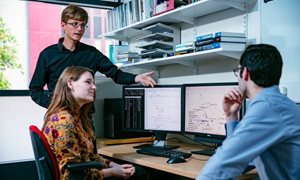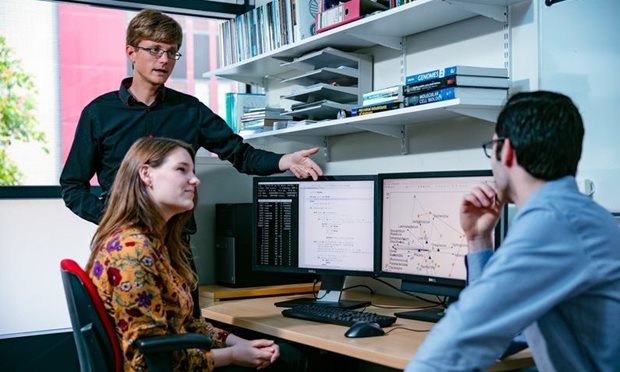

About
Who we are
At the Radboudumc Technology Center Bioinformatics we believe that computational biology and big data solutions are key in shaping the data-driven healthcare of the future. We provide complete data analysis solutions, give access to state-of-the-art bioinformatics methods and to the expertise and capabilities of Radboudumc’s bioinformatics community. The RTC is a one-stop-shop for biodata analysis with rapid deployment, with no sacrifices on data safety and privacy, to contribute to Radboudumc’s mission to have a significant impact on healthcare.
Our goals
- Provide bioinformatics advice, tools, infrastructure and services with clear price structures
- Arrange user groups, courses, network events and expert meetings to bolster interaction
- Enhance research and diagnostics through synergy, specialization and collaborations
- Leverage expertise to create opportunities and funding for clients and consortia’s
- Implement data and software standards for better safety, reproducibility and scaling
Services & expertise
What is bioinformatics
Bioinformatics combines expertise from many scientific disciplines, and concerns the processing and analyzing of large amounts of bio-data using computational methodologies.
read moreWhat is bioinformatics
The field of bioinformatics concerns the processing and analyzing of large amounts of biological data using computational methodologies. Bioinformatics combines expertise from many scientific disciplines, like biology, mathematics, statistics, computer science and biochemistry. Bioinformatics analysis can be applied to all sorts of biodata, but the biggest source of data comes from within the cell; genetics and DNA organization, gene expression and protein structures.
HOPE User-friendly web service
HOPE analyzes the structural effects of a point mutation in a protein sequence. Input your protein sequence and the mutation and HOPE will collect and combine available information from a series of web services and databases and will produce a report, complete with results, figures and animations.
visit website
Our analysis services and solutions
-
- Comprehensive QC and MultiQC reports
- UMI demultiplexing
- Differential Gene Expression Analysis
- Pathway analysis and Annotation
- PacBio Iso-Seq and Isoform Classification
- Publication-grade R graphics and plots
-
- Advanced and automated QC
- Single Cell RNA Seq analysis based on Seurat and 10X
- Cluster based Differential Gene Expression Analysis
- Cell-Cell communication using CellChat
- Bulk RNA Seq Deconvolution based on Single Cell data
-
- Single Nucleotide and Structural Variant calling and annotation
- Genome assembly, annotation and visualization
- Comparative Genomics and Phylogenetics
-
- Complete tumor analysis based on Hartwig Medical Foundation pipeline
- Tumor and metastasis evolution and phylogenetics using Conipher
- CNV and Somatic Variant Annotation
-
- Analysis of 3D-structures and complexes
- Protein homology modeling and function prediction
- Alphafold implementation and analysis
- Variant effect prediction using 3D-structures
-
- Comparative Genomics
- Whole Genome Sequencing
- Phylogenomics
-
- Metagenome assembly
- Taxonomy and Gene Function classification and annotation
- Metatranscriptomics
-
- Marker Gene Sequencing (16S, 18S, ITS)
- Single Locus Sequence Typing
- Identifying antibiotics resistance, virulence factors
-
- Linux and HPC support
- Ontology and Text mining
- Data management
- Uploading to Repository
- Data analysis automation and upscaling
Organization and people
Getting here
Visiting address
Geert Grooteplein 28
6525 GA Nijmegen
Directions



Our experts
-
Sander Bervoets Lead Product Owner
-
Tom Ederveen postdoc
-
Alem Gusinac data-analist Pathologie
-
Youkyung Lim data-analist Medical BioSciences




